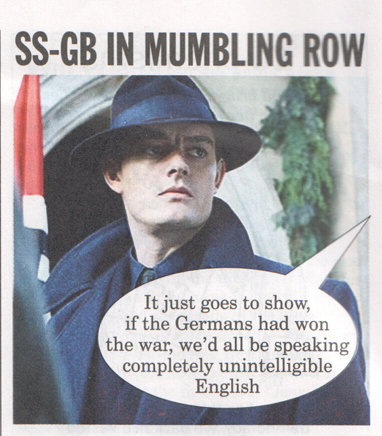SS-GB
Based on the novel by Len Deighton
Directed by Philip Kadelbach
Mumbling soundtracks …

Barely had the BBC-TV primetime series SS-GB left our screens on Sunday night when an outcry erupted from a public unable to hear the dialogue. It was a festival of mumbling and muttering.
Radio Four’s Today programme played some of the dialogue on air on Tuesday. Total mush, absolutely incomprehensible. Much of it is bad, but Sam Riley as the Scotland Yard detective in an alternative future 1941, in a Nazi-occupied London, is both the lead and one of the two major culprits. James Cosmo as Harry Woods is even worse, because a mumbled Scottish accent increases the issue.
Daisy Goodwin, the screenwriter for Victoria (which has clear dialogue) said it was the actor’s choice that he did not want to speak with crystal clear diction because a mumble preserved the enigma of the part.
I think the actor, in this case Sam Riley, has made a choice that he doesn’t want to speak with, you know, perfect crystal clear diction and I think he’s made that choice because he’s playing a very ambiguous character, a man working for police force in Nazi-occupied London, and he’s not quite sure that he wants everything he says to be understood. That would be, I guess, the thought process going through his mind. And from my experience if an actor’s made the choice about how to play a role, it’s very hard to make them change their mind about that. And also if you say Speak Up, they’ll say that’s not what my character would do.
A short defence of the BBC by Fevzi Turkalp was that modern thin screen TVs have thin crap speakers. Daisy Goodwin said she had watched on a state of the art surround system and couldn’t hear the dialogue, but still defended the actors’ interpretation. She added that so did a 16 year old have problem hearing it. It is not, as the BBC would like us to believe, ageing viewers with poor ears.
We have a Panasonic TV with a Panasonic soundbar and bass speaker in the room where we watched. You may note that in TV stores there are racks of soundbars, they demonstrate the TVs with soundbars and try to sell you sound bars. Most people have soundbars on the main TV for drama series. IF the problem was “our fault” because we were “BBC Bashers” and had “the wrong TVs” … then how come that on the same system, the next day, ITV’s Monday night primetime World War II series, Halycon had “perfect crystal clear dialogue” throughout, even over accompanying music and during air raids and a fire?
I’m having my say after twenty years of writing videos for English learners.
First, the sound recording was inept, as was the post-production sound editing and mixing.
Second, if the director, Philip Kadelbach, was too precious to tell the actors to “Speak up!” the director was not doing his job. American actors in my experience will agonise for hours on what their character would or wouldn’t do, because that’s the way they were taught. I found British ones much more likely to dispense with such worries.
Third, I conclude that the director was inept, in not following the basic grammar of film production.

Private Eye #1438, 24 February 2017
Mumbled dialogue has caused problems with many major American movies. We tried Brokeback Mountain on several systems. The accents add to the issue, but it’s mumbling and muttering from the cast that kills it, however many awards the film wrongly garnered. it’s nonsense. 0 out of 5 for me. It’s not alone and the problem is worst in US movies (but surprisingly better in US made for TV series).
Some of the American issue is a love of overdubbing dialogue later. We can tell, even if to the tiniest degree, when sound fails to synch perfectly with mouth movement. 99% isn’t good enough.
Because sound was crucial in ELT (English Language Teaching), I generally sat with the sound recordist with headphones on while we were filming. They were surprised to find the writer there at first, but got used to having an enforced new best friend. If a take was poor on sound I raised my hand, and the director called “cut.” That’s what sound supervisors do anyway. ‘No good for sound!’ That’s why they’re listening intently. Of course, as someone pointed out in The Guardian, the final say is the director on whether sound is acceptable.
I did the same if it was poor on articulation. I’m not talking about RP. We used accents, we used natural voices, but wanted clarity. I did one audio recording for one of my textbooks of pronunciation activities. We started, and I instantly realized that one of the female actors had both a lisp and a soft “r.” I said, ‘We simply cannot use her.’ The audio producer said ‘We can’t tell her that … we’ll have to use her for some dialogue and redo it tomorrow.’ I was gobsmacked … it was very well paid work. Yes, we called her, so we had to pay, but I couldn’t see why we had to fart around with valuable studio time to avoid bruising her ego. “A lot of TV directors find the lisp and soft R charming,” I was told. Fine, so she won’t have a problem working, but we were recording models of pronunciation for students worldwide to imitate. I would have paid of course, but sent her away immediately. But I’m a bastard.
I could not believe a professional scriptwriter going on air to say the director couldn’t argue down the actor’s chosen interpretation.
Look: Hierarchy … Producer … Director … Actor. That is the pecking order.
In ELT productions, the scriptwriter (me) had equal say with the director (once off the set). Once (filming Mystery Tour) the director argued the toss … he wanted a female character to put on a flimsy nightdress to answer the door, for his own gratification, I suspect. It wasn’t in the script. I said ‘Absolutely not. it’s for secondary schools. It won’t sell.’ I had every right. He was being paid. I was on a royalty from future sales and nothing more.
The director said “Get the writer off the set. It’s him or me!”
The producer said, ‘The writer stays. Take five minutes to think. Then if you can’t follow our production requirements, goodbye. I’ll direct it myself.”
The director bit his lip and continued.
The actors in SS-GB are accomplished, experienced professionals. Direct them. They can do it. They will if told. It may ruffle a few feathers, but the overall responsibility is the director’s. I was even more annoyed at the way the flak (well, it is about World War II) is directed largely at Sam Riley and James Cosmo. Yes, they were totally unintelligible at times, but actors don’t listen to the sound through headphones. They had every right to assume, unless told otherwise, that it sounded clear on the day. Thirteen people are credited in the “Sound Department” on IMDB. That’s what the sound supervisor is checking as you film. Blaming the actors is diversionary, unfair and hurtful. The fault must be the director and producer and sound department. Don’t put it on the actors. I’ll add that if I were the director, I wouldn’t let anyone else blame the actors either. The buck stops there.
On to the film grammar point. We put new dialogue on all the first three Wallace & Gromit videos. It was painstaking because even with an animation, you have to match mouth moves. Let’s return to the overdubbing in American major movies. It makes the comprehension more problematic.
In SS-GB, again and again, dialogue was heard with actors walking away, turned away from camera, in total shadow. I was getting annoyed at the ineptness of the direction on that alone, and the visual angles which were chosen greatly exacerbated the effect of the mumbling. They had whispered dialogue on wide shots. It’s simple. People whisper to you when you are close to them. You want whispering? Then you use tight close up. As has been pointed out, the Germans were far easier to understand than the English … it was in character for them to speak loudly in a commanding way AND they tended to be filmed face on.
Even better, when the Germans spoke in German we had SUBTITLES. Joy and relief. One BBC voice suggested we might use subtitles throughout if we had problems … what?
The BBC say they’ll investigate “boosting the audio” for episode 2.
Well, they can remix the levels against background noise and music and it might help a bit. They can boost treble too, which sometimes helps. But in the end loud inarticulate mumbling is still inarticulate mumbling. I’ll try ten minutes of episode 2, and if the boost does nothing, switch off.
And please, BBC apologists (there are a bunch who claim it was clear), just do an audio comparison with ITV’s Halcyon.


I’ll add that Halcyon’s fictional version of real London 1940, is a far better story than Deighton’s alternative reality. Philip K. Dick’s original novel, The Man in The High Castle was written in 1962, and set in an alternate future after Japan and Germany had won the war. Len Deighton’s SS-GB dates from 1978. Now we have the TV series for both. The Philip K. Dick were the inspiration for both the Deighton novel and the BBC series, I suspect.
EPISODE TWO

Boosted top end aided clarity, and they balanced the vocal track higher against background … though still inept in seeing mouths move, or speakers at a plausible distance. Mainly I could hear it better than epode one.
Leave a comment